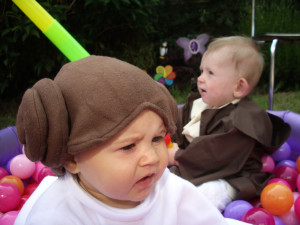You either think it’s all wonderful (you’re wrong) or it’s all terrible (you’re wrong).
And when it comes to editing, with or without beta readers, you’ll have to make your own decisions at some point.
So is it possible to look at your own work with complete impartiality?
Well, no. But with the right preparation, you can get close.
- Step away from the novel. Don’t even look at it for at least a month. Work on something different (NOT the sequel).
- Feed the machine. In that same month, read some classics and award-winners. Avoid the “guilty pleasure” books that are horribly written but that you love anyway – those are for another time. Get your brain used to the good stuff so it can recognize the bad stuff (like eating McDonald’s after months of home-cooked meals, it stays with you in a nasty way).
- Feed the machine some more. Also re-watch some of your favorite movies – being shorter than books, they more clearly show the plot as a whole. Note how each story is structured. How does it open? How does the tension escalate? How does the hero reach his lowest point? What ultimate decision does he make?
- Review. Read good books and/or movie reviews, especially ones that point out plot faults. This will help you identify problems in your own work. For instance:
- David’s amazingly insightful reviews at Twilight’s Warden
- The hilarious animated video series How It Should Have Ended
- The brilliant (though horribly crass, so be warned) reviews at Red Letter Media (I’ve only watched the Star Wars ones)
- Tell your ego to shut up. We writers have a tendency to waver between extremes of pretentiousness (“They just don’t understand my brilliance!”) and anxiety (“They’re going to think I’m an idiot.”). Tune out both these voices. Neither is truthful.
- For the pretentious voice: Let go of the things you refused to change before. Pretty paragraphs you refused to delete. Lovable characters you refused to kill. Look at those “non-negotiables” and ask why? If you don’t have a real reason (e.g., “to be edgy” is not a real reason to be gratuitous), then change it. There are many ways a story can play out, and there’s probably a much more exciting and meaningful way yours can.
- For the anxious voice: Every good writer is scared when he releases something new into the world. That’s normal. But ask yourself: does a certain part scare you—a certain phrase or scene? Does it scare you because it sounds juvenile, or because it exposes a piece of you? If the former, change it. If the latter, have the courage to leave it.
- Create a deleted scenes file. You know you should cut something—but it’s also pretty good writing; what if you need it somewhere else later? Don’t be paralyzed by uncertainty. Simply copy, cut and paste any major deletions into a new file. Soon you’ll have a much cleaner manuscript and a whole list of ideas to fall back on should you ever need it.
What part of self-editing gives you the most trouble?
—



![When the pages are closing in on you. [image by Thanakrit Du]](http://bekindrewrite.files.wordpress.com/2013/01/pagesclosingin.jpg?w=300)



